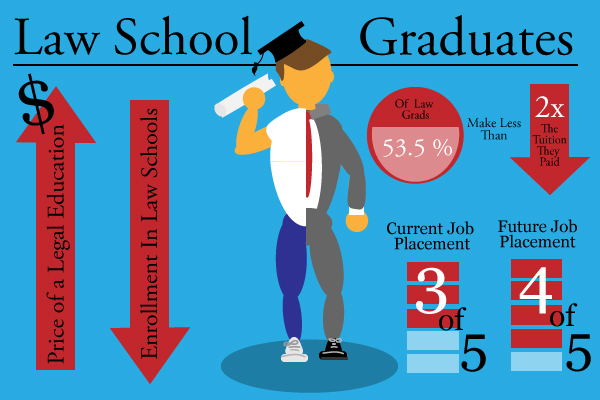
St. Thomas School of Law professor Jerry Organ’s study shows that 53.5 percent of law graduates are earning salaries less than two times the tuition they paid for their law degrees.
Organ, with the help of research assistants, used a financial viability formula that University of Louisville law professor Jim Chen developed to look at employment outcome data per school and matched it with national salary statistics.
“If you use the metric of being able to purchase the largest house (law graduates) would like to purchase, they are not able to do that,” Organ said.
The study shows legal education is significantly less affordable than it used to be, especially when considering where a student chooses to enroll and whether or not students are receiving scholarships.
“Does that mean they aren’t making a living? No, I think that’s a slight overstatement,” Organ said. “But it means they’re struggling. They’re either renting … or if they are buying a house, they are buying a much smaller house than their income might otherwise allow them to buy because they have this huge educational debt.”
St. Thomas law student Ryan Gott said he is concerned about what the analysis says about law graduates, but ultimately thinks hard work and confidence will pay off in the end.
“(The law school is) very competitive,” Gott said. “There are a lot of smart people and if you want to be successful and be able to pay off your debt, because of the high cost of education, you need to do well and succeed academically.”
Organ said although legal education is less affordable as a whole, states like California, Massachusetts, New York and Illinois are the least affordable. However, the statistics show that students don’t seem to be concerned about affordability.
“(Affordable law schools) are experiencing the same decline in applications, the same declines in enrollment, the same declines in their LSAT/GPA profiles as other more expensive schools. Right now, it doesn’t appear as if students are the most sophisticated consumers,” Organ said.
Despite the negative trends for law graduates, Organ expects future years to show improvement because fewer students are enrolling in legal education.
“The employment statistics next year may not be great, but the years after that, we are likely to see an improved employment outcome. Whether there are more jobs, there will be fewer graduates,” Organ said.
Law student Devin Bruce said there is hope that the cycle will turn around for future law graduates.
“A lot of older lawyers are about to retire, but aren’t necessarily giving up their job right now because the economy is not doing as well as hoped,” Bruce said. “There is some hope in the future that maybe a few years after graduation that we’ll finally get those firm jobs.”
With costs of tuition for law graduates and fewer graduate enrollments continuing to be an issue, Organ said law schools need to learn how to be innovative in the future.
A statement in Organ’s study reads, “Law schools also will have to explore ways to continue to provide a high quality legal education more cost-effectively, just as law firms have been exploring ways to provide high quality legal services more cost-effectively over the last few years.”
Zach Zumbusch can be reached at zumb8499@stthomas.edu.
